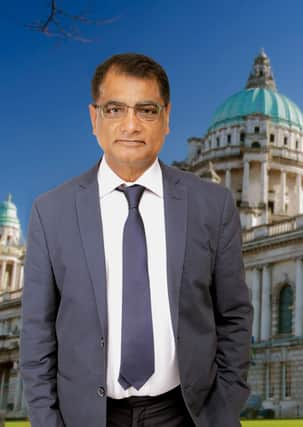Sometimes they would shout ‘Paki Paki’ but there were positives, the NI people were very friendly


A consultant anaesthetist with the Belfast Trust, moved from Delhi to Northern Ireland 20 years ago to do his fellowship.
He lives in Newtownabbey with his wife Madhi, a gynaecologist, and has three grown-up children.
Advertisement
Hide AdAdvertisement
Hide AdDr Singhal, who is also the chairman of the Indian Community Centre in Belfast, said when he arrived in Northern Ireland there were very few “brown faces”.
“I walked from the city centre to the Royal Hospital and I did not see one brown face.
“Sometimes people would shout ‘Paki, Paki’, but they didn’t know the difference between Indians and Pakistanis.
“But there were a lot of positives. The people were very, very friendly.”
Advertisement
Hide AdAdvertisement
Hide AdDr Singhal said: “The first Indian came to Northern Ireland in 1932. His name was Mr Chada. Up until 1965 there were around 100-120 families from the Punjab in Northern Ireland and their main business was door-to-door selling.
“When the Troubles started there was basically no immigration up until 1998 after the Good Friday Agreement.
“The UK government came out with a programme called the Highly Skilled Migrant Programme. They were short-staffed in skills like doctors and engineers and this was a points-based system for whether you could come straight here and work. So, most of the Indian people came from 2000 to today.”
He added: “Today we represent between 12-15,0000 Indians in Northern Ireland and come from all parts of India.
Advertisement
Hide AdAdvertisement
Hide Ad“Most of the Indians who are here are either professionals or business people - nurses, doctors, engineers and those working in companies. I think there are more than 14 Indian companies operating in Northern Ireland.
“We represent one per cent of the whole UK population and our GDP contribution is 7 per cent. You will not see asylum seekers or (Indian) people on the dole. Our philosophy is to work.”
In terms of the recent Black Lives Matter rallies, Dr Singhal said: “From my personal point of view I would say, yes, we must respect all communities. Black lives matter, yes, but from my point of view, every life matters.”
Dr Singhal, a Hindu, said: “We have a philosophy that ‘the whole Earth is one family’.
Advertisement
Hide AdAdvertisement
Hide Ad“There are differences and variations, but you need to live together, not only live together between the human race, but how we live together with the animal race, with the plants, with the living and non-living.”
But, he said, people always have a “fear of the unknown”.
“The people in Northern Ireland, they had not experienced the ethnic minorities before, but I can see the change in 20 years.
“Around 12 or 15 years ago I was speaking to a group in Newtownabbey and this old woman asked, ‘See these nurses that come from India, do they know English?’.
“To be honest the kind of English test that you have to take before you come to the UK, I can promise that 70 per cent of local people will fail it. It is such a high standard.”
Advertisement
Hide AdAdvertisement
Hide AdHe added: “The important thing is interaction - if you don’t interact you don’t come to know each other.”
A message from the Editor:
Thank you for reading this story on our website. While I have your attention, I also have an important request to make of you.
With the coronavirus lockdown having a major impact on many of our advertisers - and consequently the revenue we receive - we are more reliant than ever on you taking out a digital subscription.
Subscribe to newsletter.co.uk and enjoy unlimited access to the best Northern Ireland and UK news and information online and on our app. With a digital subscription, you can read more than 5 articles, see fewer ads, enjoy faster load times, and get access to exclusive newsletters and content. Visit https://www.newsletter.co.uk/subscriptions now to sign up.
Advertisement
Hide AdAdvertisement
Hide AdOur journalism costs money and we rely on advertising, print and digital revenues to help to support them. By supporting us, we are able to support you in providing trusted, fact-checked content for this website.
Alistair Bushe
Editor